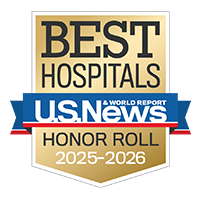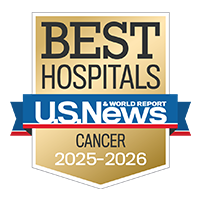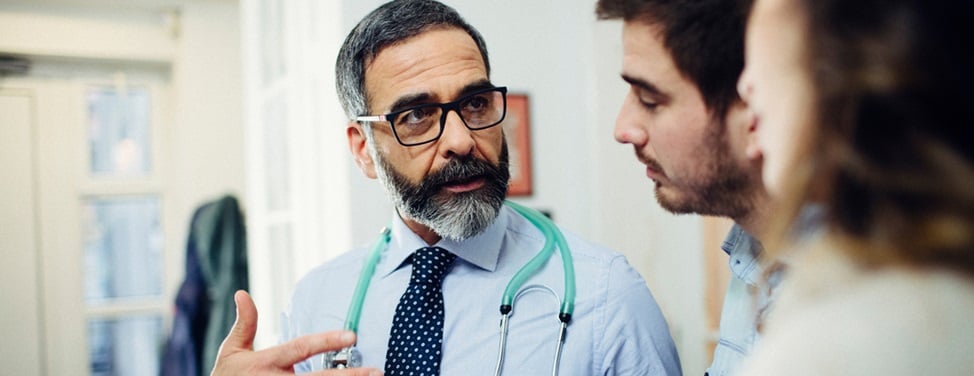Stomach Cancer

Overview
Every year 13,000 men and 8,000 women in the United States are diagnosed with stomach cancer, also called gastric cancer. The cancer usually begins in the cells of the inner layers of the stomach and sometimes spread deeply into the stomach wall. Stomach cancer mostly affects the elderly – two-thirds of those who have it are over the age of 65. It can be difficult to diagnose in its early stages, so it is often diagnosed late.
Our approach to stomach cancer
UCSF's highly trained gastrointestinal oncologists and surgeons provide the most advanced and effective treatments available for stomach cancer. Our team will give you a precise diagnosis and design a personalized treatment plan, which may include surgery, chemotherapy or radiation. You may also be able to participate in clinical trials of promising new therapies.
In addition, we offer continued care for patients who have completed treatment for gastrointestinal cancers. Our survivorship clinic aims to maximize quality of life and minimize risk of recurrence.
Awards & recognition
-

Among the top hospitals in the nation
-

Best in California and No. 7 in the nation for cancer care
-

Designated comprehensive cancer center
Signs & symptoms
Cancer of the stomach, also called gastric cancer, can be difficult to detect before it has spread. Often, there are no symptoms in the early stages. When symptoms do occur, they may include the following:
- Indigestion or heartburn
- Discomfort or pain in the abdomen
- Nausea and vomiting
- Diarrhea or constipation
- Bloating of the stomach after meals
- Loss of appetite
- Weakness and fatigue
- Bleeding, including vomiting blood or having blood in the stool
Diagnosis
To find the cause of symptoms, your doctor will take your medical history, perform a physical exam and recommend laboratory studies. You also may have one or all of the following exams:
- Fecal occult blood test (FOBT). FOBT is a check for hidden (occult) blood in the stool. This test is done by placing a small amount of stool on a plastic slide or on special paper. It may be tested in your doctor's office or sent to a laboratory. This test is done because stomach cancer sometimes causes bleeding that cannot be seen. However, noncancerous conditions also may cause bleeding, so having blood in the stool does not necessarily mean that a person has cancer.
- Upper GI series. These are X-rays of the esophagus and stomach (the upper gastrointestinal, or GI, tract). X-rays are taken after you drink a barium solution, a thick, chalky liquid. This test is sometimes called a barium swallow. Barium outlines the stomach on the X-rays, helping your doctor find tumors or other abnormal areas. During the test, your doctor may pump air into the stomach to make small tumors easier to see.
- Endoscopy. This is an exam of the esophagus and stomach using a thin, lighted tube called a gastroscope, which is passed through the mouth and esophagus to the stomach. Your throat is sprayed with a local anesthetic to reduce discomfort and gagging. You also may receive medicine to relax them. Through the gastroscope, your doctor can look directly at the inside of the stomach. If an abnormal area is found, your doctor can perform a biopsy, or remove some tissue through the gastroscope.
- Biopsy. A biopsy is a tissue sample that is examined under a microscope, the only sure way to know whether cancer cells are present.
Treatments
Radiation therapy
Radiation therapy is the use of X-rays or other high-energy rays to kill cancer cells and shrink tumors. Radiation for gastric cancer comes from a machine outside the body, or external radiation therapy. Radiation can be used alone or in addition to surgery and chemotherapy.
Chemotherapy
Chemotherapy uses drugs to kill cancer cells. Chemotherapy may be taken by pill, or it may be put into the body by a needle in the vein or muscle. Chemotherapy is called a systemic treatment because the drug enters the bloodstream, travels through the body, and can kill cancer cells outside the stomach.
Treatment given after surgery when no cancer cells can be seen is called adjuvant therapy. There is evidence that adjuvant therapy consisting of chemotherapy and radiation following surgery for cancer of the stomach is effective in some patients.
Surgery
Surgery, called gastrectomy, is the most common treatment for stomach cancer. The surgeon removes part or all of the stomach, as well as some of the tissue around the stomach.
After a partial gastrectomy, your doctor connects the remaining part of your stomach to the esophagus or the small intestine. After a total gastrectomy, your doctor connects the esophagus directly to your small intestine.
Because cancer can spread through the lymphatic system, lymph nodes near the tumor are often removed during surgery so a pathologist can check them for cancer cells.
UCSF Health medical specialists have reviewed this information. It is for educational purposes only and is not intended to replace the advice of your doctor or other health care provider. We encourage you to discuss any questions or concerns you may have with your provider.
Recommended reading
Where to get care (2)
Related clinics (5)

Osher Center for Integrative Health
 2
2































